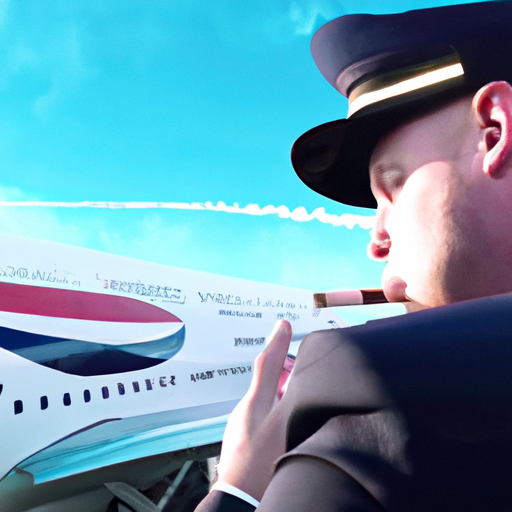
The Consequences of Drug Use in the Aviation Industry
British Airways Fires A380 Pilot for Drug Use During Layover and Boasting
Drug use in any industry can have serious consequences, but when it comes to the aviation industry, the stakes are even higher. The recent case of a British Airways A380 pilot being fired for drug use during a layover and boasting about it serves as a stark reminder of the potential dangers and repercussions of such actions.
The incident came to light when a fellow crew member overheard the pilot bragging about his drug use during a layover in a popular tourist destination. Concerned about the safety of passengers and the reputation of the airline, the crew member reported the incident to the airline management. British Airways took immediate action, launching an investigation into the matter.
The consequences of drug use in the aviation industry are severe, and for good reason. Pilots are responsible for the lives of hundreds of passengers on each flight, and any impairment, whether physical or mental, can have catastrophic consequences. The use of drugs, even during a layover, can impair judgment, reaction time, and decision-making abilities, all of which are critical skills for a pilot.
In addition to the potential risks to passengers, drug use also poses a significant threat to the reputation of the airline. Airlines are entrusted with the safety and well-being of their passengers, and any breach of that trust can have long-lasting consequences. Passengers need to have confidence in the professionalism and integrity of the pilots and crew members who are operating their flights.
The case of the British Airways pilot serves as a reminder that drug use in the aviation industry will not be tolerated. Airlines have strict policies and procedures in place to ensure the safety of their passengers, and any violation of these policies can result in immediate termination. This zero-tolerance approach is necessary to maintain the highest standards of safety and professionalism in the industry.
It is not just the immediate consequences of drug use that pilots need to be aware of; there are also long-term implications. The use of drugs can have a detrimental impact on a pilot’s career, as it can lead to the revocation of their pilot’s license. Once a pilot’s license is revoked, it can be extremely difficult, if not impossible, to regain it. This means that a pilot who engages in drug use not only risks their current job but also their future prospects in the industry.
To prevent drug use in the aviation industry, airlines have implemented rigorous drug testing programs. Pilots are subject to regular and random drug tests to ensure that they are not under the influence of any substances that could impair their ability to perform their duties safely. These tests are an essential part of maintaining the highest standards of safety and professionalism in the industry.
In conclusion, the recent case of a British Airways A380 pilot being fired for drug use during a layover and boasting about it highlights the severe consequences of drug use in the aviation industry. The potential risks to passengers, the reputation of the airline, and the long-term implications for a pilot’s career make it clear that drug use will not be tolerated. Airlines have strict policies and procedures in place, including rigorous drug testing programs, to ensure the safety and well-being of their passengers. It is crucial for pilots to understand the gravity of their actions and the potential consequences before engaging in any form of drug use.
The Importance of Maintaining Professionalism in the Workplace

Maintaining professionalism in the workplace is crucial for any employee, regardless of their position or industry. It not only reflects positively on the individual but also on the company as a whole. Recently, British Airways made headlines when they fired an A380 pilot for drug use during a layover and boasting about it. This incident serves as a reminder of the importance of professionalism and the consequences that can arise from its absence.
Professionalism encompasses a wide range of behaviors and attitudes that contribute to a positive work environment. It includes being punctual, dressing appropriately, and adhering to company policies and procedures. It also involves maintaining a respectful and courteous demeanor towards colleagues, superiors, and customers. By embodying these qualities, employees demonstrate their commitment to their work and their dedication to the success of the organization.
In the case of the A380 pilot, his actions clearly violated the principles of professionalism. Drug use is not only illegal but also poses a significant risk to the safety of passengers and crew members. By engaging in such behavior, the pilot not only jeopardized the lives of those on board but also undermined the trust and confidence that passengers place in the airline. Furthermore, boasting about his actions showed a complete disregard for the seriousness of the situation and a lack of understanding of the consequences that could follow.
Maintaining professionalism is not only important for the individual but also for the overall success of the company. When employees conduct themselves in a professional manner, it creates a positive work environment where everyone feels respected and valued. This, in turn, leads to increased productivity and efficiency. Customers also benefit from interacting with professional employees, as it enhances their experience and perception of the company. A single incident of unprofessional behavior can tarnish the reputation of an entire organization, leading to a loss of business and trust.
To ensure professionalism is upheld in the workplace, companies must establish clear expectations and provide training and support to their employees. This includes educating employees on the importance of professionalism and the potential consequences of its absence. It also involves providing resources and guidance on how to handle challenging situations and make ethical decisions. By investing in the development of their employees, companies can foster a culture of professionalism that permeates throughout the organization.
In the case of British Airways, their swift action in firing the A380 pilot sends a strong message about their commitment to maintaining professionalism. It demonstrates that they prioritize the safety and well-being of their passengers above all else. It also serves as a reminder to other employees that unprofessional behavior will not be tolerated and will be met with severe consequences.
In conclusion, maintaining professionalism in the workplace is of utmost importance. It not only reflects positively on the individual but also on the company as a whole. The recent incident involving the A380 pilot at British Airways serves as a stark reminder of the consequences that can arise from the absence of professionalism. By upholding high standards of behavior and conduct, companies can create a positive work environment, enhance their reputation, and ensure the safety and satisfaction of their customers.
The Impact of Social Media on Employee Behavior and Accountability
British Airways Fires A380 Pilot for Drug Use During Layover and Boasting
In today’s digital age, social media has become an integral part of our lives. It allows us to connect with friends and family, share our thoughts and experiences, and even showcase our professional achievements. However, with the rise of social media, there has also been an increase in instances where employees’ behavior and accountability have been compromised. One such incident recently occurred at British Airways, where an A380 pilot was fired for drug use during a layover and boasting about it on social media.
Social media platforms like Facebook, Twitter, and Instagram have given individuals a platform to express themselves freely. While this can be a positive thing, it can also lead to employees making poor choices and engaging in behavior that reflects poorly on their employers. In the case of the British Airways pilot, his decision to use drugs during a layover and then boast about it on social media was not only illegal but also a violation of the airline’s code of conduct.
The pilot’s actions came to light when a fellow employee stumbled upon his social media posts. The posts included pictures of the pilot using drugs and captions that boasted about his actions. Understandably, this caused outrage among the airline’s management and the public. British Airways, known for its commitment to safety and professionalism, took immediate action and terminated the pilot’s employment.
This incident highlights the impact of social media on employee behavior and accountability. In the past, employees may have engaged in inappropriate behavior outside of work, but it was less likely to be documented and shared with the world. With social media, however, employees’ actions can be easily captured and disseminated, leaving little room for deniability.
Employers now have to grapple with the challenge of monitoring their employees’ online activities. While it is important to respect employees’ privacy, it is also crucial for companies to protect their reputation and ensure that their employees are upholding their values. Many companies have implemented social media policies that outline acceptable behavior and the consequences for violating those guidelines. These policies serve as a reminder to employees that their actions online can have real-world consequences.
The British Airways incident also raises questions about the role of social media in employee accountability. In the past, employees may have been able to engage in inappropriate behavior without facing any repercussions. However, with social media, employees are now more accountable for their actions, both inside and outside of the workplace. Employers can use social media as a tool to hold employees accountable for their behavior and ensure that they are representing the company in a positive light.
In conclusion, the incident involving the British Airways pilot serves as a reminder of the impact of social media on employee behavior and accountability. While social media has its benefits, it also presents challenges for employers in monitoring and managing their employees’ online activities. Companies must establish clear guidelines and policies regarding social media use to protect their reputation and ensure that employees understand the consequences of their actions. Ultimately, employees must recognize that their behavior online can have real-world consequences and act accordingly.


